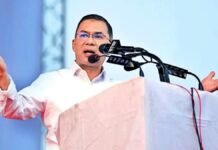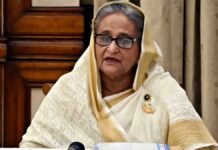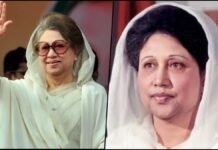
Key Points
- Election Date Announced: Interim leader Mohammad Yunus sets general elections for the first half of April 2026.
- Caretaker Government Under Pressure: Public, political parties, and the army demanded early elections after growing dissatisfaction with Yunus’s leadership.
- Awami League Banned: Former PM Sheikh Hasina’s party is barred from contesting under anti-terrorism laws.
- First Vote Since Rebellion: These will be the first elections since the violent protests and Hasina’s ouster in 2024.
- Electoral Reforms Promised: Yunus pledges necessary reforms and a peaceful environment for free and fair elections.
Dhaka: Bangladesh, India’s close neighbor, is poised for a major political transition as interim Prime Minister and Nobel laureate Mohammad Yunus announced that the country will hold general elections in the first fortnight of April 2026. The announcement comes after months of mounting pressure from citizens, political parties, and the military, all dissatisfied with the caretaker government’s performance and demanding a return to democratic governance.
Yunus Announces Election Date Ahead of Bakrid
Addressing the nation on Friday, just days before Bakrid, 84-year-old Mohammad Yunus confirmed on national television, “I inform all citizens that elections will be held any day in the first fortnight of April 2026.” Yunus, who has led the caretaker government since August 2024, emphasized that the Election Commission will soon release a detailed schedule and that the government is working to ensure a peaceful and conducive environment for the polls.
Political Instability and the Road to Elections
Bangladesh has been grappling with instability since widespread violent protests erupted last year, culminating in the ouster of Prime Minister Sheikh Hasina and her Awami League government in August 2024. The unrest, fueled by a student-led movement, forced Hasina into exile in India, where she has remained ever since. In the aftermath, Mohammad Yunus was appointed to head an interim government tasked with restoring order and paving the way for fresh elections.
Ban on Awami League: A Major Political Shift
In a dramatic development, the interim government last month banned Sheikh Hasina’s Awami League party from participating in the upcoming elections, invoking anti-terrorism legislation. The ban will remain in place until the International Crimes Tribunal concludes its hearings on charges against the party and its leaders. This move marks a significant setback for Hasina and her supporters, effectively excluding one of Bangladesh’s most influential political forces from the electoral process.
Electoral Reforms and Future Prospects
Yunus, a globally respected Nobel laureate, has repeatedly stressed the need for comprehensive reforms to the electoral process. He assured the public that the caretaker administration is committed to ensuring free, fair, and transparent elections. The announcement of the election date follows an all-party meeting and months of speculation, with previous hints that polls could be delayed until as late as June 2026.
What’s Next for Bangladesh?
The upcoming elections will be the first since the 2024 rebellion and are expected to reshape Bangladesh’s political landscape. With the Awami League sidelined and new reforms promised, the polls could mark a turning point for the nation’s democracy and stability.





















































